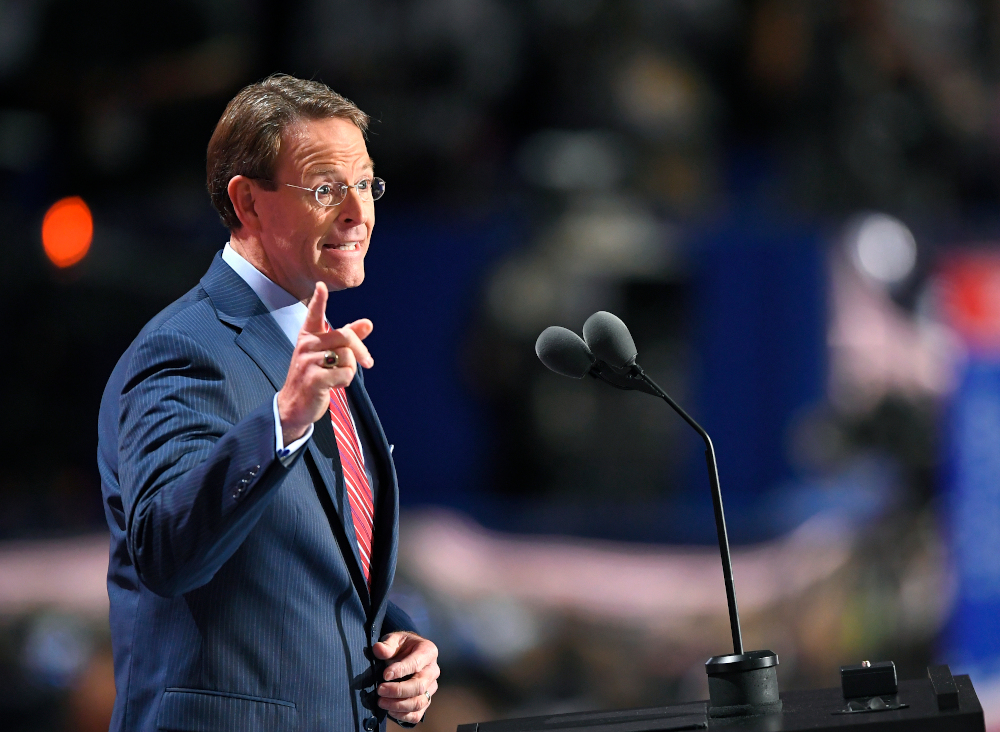
In a Thursday, July 21, 2016 file photo, Tony Perkins, president of the Family Research Council, speaks during the final day of the Republican National Convention in Cleveland. The federal commission that tracks global religious freedom is facing a schism with Capitol Hill over a proposal that some members warn would hurt its effectiveness.(AP/Mark J. Terrill, File)
The federal commission that tracks global religious freedom is facing a rift with Capitol Hill over a proposal that some members warn would hurt its effectiveness.
At issue is bipartisan legislation introduced two months ago to reauthorize the U.S. Commission on International Religious Freedom for four years. The bill also would ask the commission to review “the abuse of religion to justify human rights violations” — a responsibility not defined in more detail — and restrict commissioners from using their federal title when they speak as private citizens. Additionally, commissioners would have to report to Congress on international travel paid for by sources outside their families or the government.
In a capital often dominated by partisan polarization, those proposed changes created a rare division: senators in both parties seeking increased oversight, and commissioners in both parties balking.
The bipartisan commission, established in 1998 by Congress, has used its megaphone to amplify hot-button religious freedom issues worldwide, ranging from the detainment of an American pastor in Turkey to inflammatory content in Saudi textbooks. But the presence of three prominent conservative evangelicals on the commission at a time when President Donald Trump is elevating religious freedom is sparking debate about whether it can stay above the political fray.
The tension seeped into public view last week when one GOP-appointed commissioner, Kristina Arriaga, resigned from her post with a warning against the legislation released by GOP and Democratic senators.
Arriaga opposes the proposed new oversight requirements for commissioners, writing to The Associated Press that the bill would turn a unified commission into a “useless bureaucracy.” But she also sees problems in Congress asking the commission to vet human rights infringement, predicting that it could mire their portfolio in same-sex marriage, circumcision and other politically volatile religious topics.
“Expanding the mission to include the possibility of discussing religious practices as human rights violations sounds innocuous,” Arriaga said in an interview, “but it opens up a whole theological discussion about what happens inside of religions.”
A leading Republican working on a bipartisan agreement to reauthorize the commission, Florida Sen. Marco Rubio, tweeted Friday in response to a Wall Street Journal op-ed Arriaga published that the proposed changes she decried were part of the process of legislative compromise.
In fact, some of the changes Arriaga opposes were aimed at ensuring commissioners — who serve as unpaid volunteers — don’t misrepresent the religious freedom body while speaking as private individuals. One commissioner, Trump evangelical adviser Johnnie Moore, has met twice in the past year with Saudi Crown Prince Mohammed bin Salman, whose kingdom’s long-standing restraint of religious freedom has drawn criticism from the commission.
The Senate proposal "may have been well-intended, but it will have unintended consequences,” Moore said in an interview.
Moore added that he personally pays for international travel he takes to advocate for global religious freedom and interfaith collaboration.
“What is clear is that religious freedom is becoming more of a partisan issue, and it used to be an entirely bipartisan issue,” Moore said. “I think that’s the biggest loss in this.”
The Senate proposal reauthorizing the commission was set for consideration at a Foreign Relations Committee meeting in September but got postponed amid the pushback.
The committee’s top Democrat, New Jersey Sen. Robert Menendez, questioned at that time whether commissioners critical of the proposed new oversight requirements might be “part of the problem,” according to the transcript of the meeting. Menendez also said that the commission already tackles human rights issues, questioning why the addition of that responsibility would be contentious.
The commission is expected to keep operating on a short-term basis while talks continue about a longer-term agreement. Eight commissioners from both parties, all except Arriaga, sent an Oct. 22 letter to Rubio that acknowledged the value of tackling “issues identified in the past head-on” while raising “concerns” with the Senate bill as introduced.
Among the commission's past issues is a controversy over alleged religious discrimination, with a Muslim attorney filing suit in 2012 claiming that she was denied a permanent staff post there because of her faith.
The commission’s most prominent role involves reviewing the status of religious freedom worldwide and making recommendations to the executive branch as well as Congress, including annual reporting on nations where people of faith face persecution. Despite its multiple members supportive of the president, the commission in September urged his administration against further cuts to the nation’s refugee resettlement cap. (Trump ultimately slashed the cap to a historic low.)
“We’ve lasted for 20 years because there’s no daylight between Republicans and Democrats on our mission and mandate,” said Nadine Maenza, a Republican-appointed vice chair of the commission. “The minute there is, and one side can be pitted against the other side ... the loser will be religious freedom.”
Concerns among some religious freedom commissioners about the bill's expanded human rights responsibilities are not entirely limited to its conservatives, who include two other Trump evangelical advisers: Tony Perkins, president of the right-leaning Family Research Council, and Gary Bauer, president of the right-leaning group American Values.
Gayle Manchin, a Democratic-appointed commissioner and wife of West Virginia Sen. Joe Manchin, said in an interview that while religious freedom and other issues often overlap, members “did not want our mission to be watered down or filtered out in a lot of different directions.”
Perkins tweeted Friday that he was “surprised” by Arriaga’s departure even as he echoed her worries about the Senate bill.
“We will continue to work to ensure (the commission) will not be put on a short leash, but remain a watchdog for religious freedom,” Perkins wrote.
Advertisement




